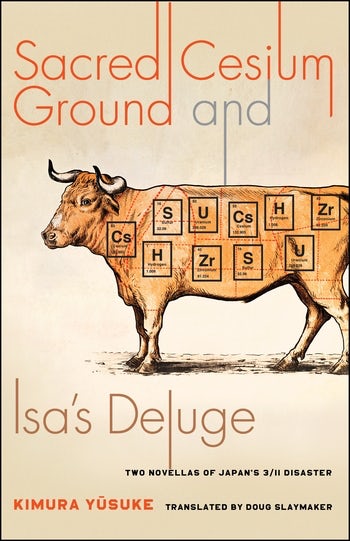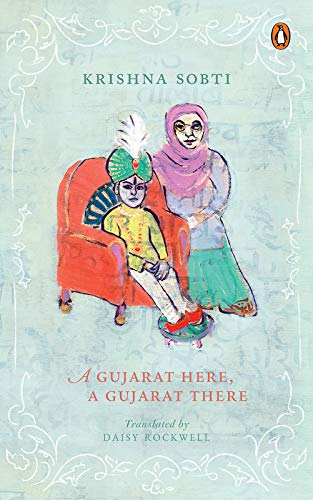KIMURA Yūsuke, Sacred Cesium Ground and Isa’s Deluge: Two Novellas of Japan’s 3/11 Disaster, trans. Douglas Slaymaker (NY: Columbia University Press, 2019)
Some years hence, some tens of years perhaps, but it was going to happen: this place was going to disappear. Nonetheless, right now, as I looked around, a light was shining in the distance. Compared with that shabby weak light, the darkness that enveloped this area was oppressive, and winning out. I continue to look at that shining light and lose the sense that the ground under my feet is connected to that space over there—this: an area from which seeds will grow. What that phrase came to mind, the light over there, a very faint light, seemed to get brighter. And I felt that I could not see cows standing in that light, cattle now deemed to have no use or value, calmy chewing on the grass, now and far into the future.
–From “Sacred Cesium Ground”
The two novellas translated in this book by Douglas Slaymaker represent the first English translations of one of Japan’s most promising emerging, young writers, a native of Tōhoku in northeastern Japan, who rose to national prominence after the catastrophic earthquake, tsunami, and nuclear meltdown of 2011. As a native of the disaster zone, Kimura bore special witness to the long-term effects of the disasters, and in this book, he uses masterful storytelling technique, often punctuated with dream-like narration and bouts of stream-of-thought introspection, to explore changes to the physical environment, as well as the deeper psychological effects of the disasters on individuals and the national psyche. Kimura has often been described as giving voice to the many voiceless victims of the disasters, but just as Covid-19 drew attention to the structural inequalities of America’s class system, Kimura demonstrates how the 2011 disasters produced dramatically unequal effects, disproportionately affecting senior citizens, the economically disenfranchised, and even the non-human residents of the area.
The first novella was inspired by a real-life farm in the Fukushima evacuation zone which became nationally famous when the farmer in charge ignored government orders to put his animals to death and leave the region; instead, he stayed, risking his own health to care for the countless abandoned irradiated animals left to miserable deaths from starvation and radiation exposure. The second novella, a dramatic novel about a man getting in touch with his past in the region, follows a man as he learns about his family’s role in the subjugation of northeastern Japan and the long history of racialized socioeconomic inequality that has long plagued the region. In a country that has often misleadingly described itself as a homogenous nation without minorities, Kimura has emerged as a welcome critical voice showing the various interlocking forms of inequality, oppression, and environmental degradation that have girded Japan’s modernity.
Krishna SOBTI, A Gujarat Here, A Gujarat There, trans. Daisy Rockwell (Delhi: Penguin India, 2019)
000000Death—death—death!
000000Now the saviours and the hungry dogs have become one, who will open the
police ledger?
000000Shut up. Don’t talk gibberish.
000000Completely silent.
000000Look at that, a procession of corpses—
000000It recoils near the little half-dead girls. They too grab hold of our fingers, hoping
to increase their number; they wish to stamp our hands.
000000The death vote.
000000Our history is yet to be written.
000000Efforts are ongoing.–Krishna SOBTI, A Gujarat Here, A Gujarat There
This gorgeously wrought, poetic, and polyvocal narrative by Krishna Sobti is a masterpiece of mid-century modernist writing translated by Daisy Rockwell. It takes place in the immediate aftermath of the bloody 1947 Partition that divided colonial India into two new nations—independent India and Pakistan—but also created massive unrest that displaced 14 million people. Based on Krishna Sobti’s own experiences as an educated woman who lost her own home when Pakistan took over her portion of Gujarat, the book follows the protagonist as she takes refuge in Sirohi, one of India’s last remaining princely states, and begins working as a tutor. However, over the course of the book, readers watch as the new nation of India flexes its might, taking over the kingdom and incorporating it into the new Indian state of Rajasthan. Through these multiple levels of displacement and disenfranchisement, the book explores the complicated ways that different, intersecting modes of positionality—birthplace, religion, caste, gender, and social standing—shaped individuals fate as India came into being.
The language of the original is complex, creative, and multi-layered, reflecting the complex linguistic situation of India itself. Although Sobti wrote the book in Hindi, her text is rich with Punjabi and Gujarati expressions, and the translator Daisy Rockwell has made great efforts to reveal the rich linguistic complexity of the original. Moreover, Rockwell has managed to skillfully navigate the extremely complex shifting perspectives—sometimes first-person, sometimes third-person, sometimes dream-like narration, sometimes realistic, sometimes past tense, sometimes present tense—that make this continually surprising book such a dramatic modernist accomplishment.
Jeffrey Angles (1971-) is a poet, translator, and professor of Japanese literature at Western Michigan University. His collection of poetry Watashi no hizukehenkōsen (My International Date Line, 2016), which he wrote in Japanese, won the highly coveted Yomiuri Prize for Literature, comparable to the Pulitzer Prize in the US. He is the first non-native speaker ever to win for a book of poetry. In addition, he has published dozens of translations of Japan’s most important modern authors and poets earning numerous prizes for his translation work. He believes strongly in the role of translators as activists, and much of his career has focused on the translation into English of socially engaged, feminist, or queer writers. He has published Killing Kanoko: Selected Poems of Hiromi Itō and Wild Grass on the Riverbank, also by Hiromi Itō, with Action Books.

